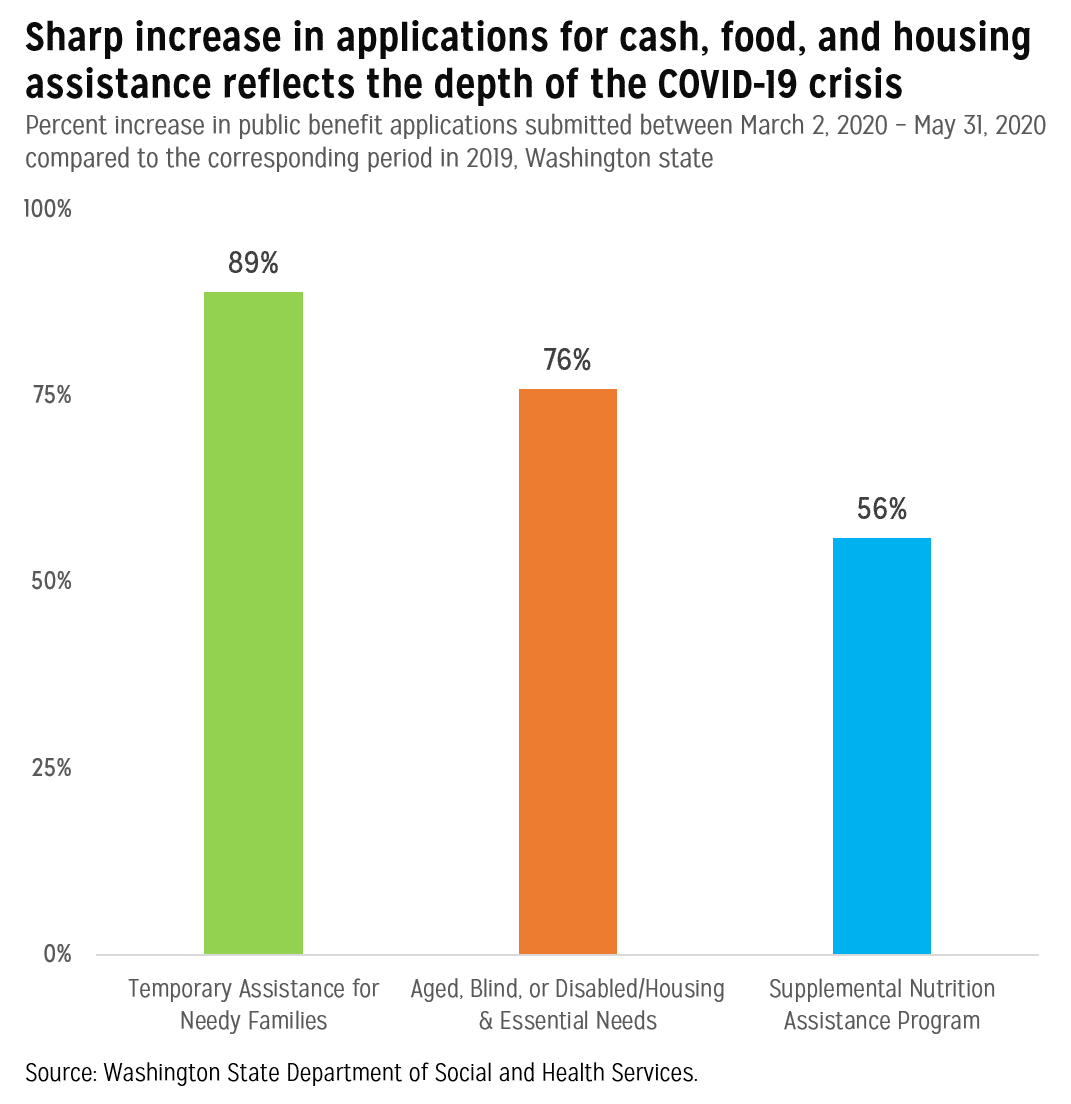Washingtonians who have been hard-hit by the COVID-19 crisis are doing everything they can to support themselves and their families in the midst of deepening economic insecurity. As individuals and families work to make ends meet, applications for public supports have soared in Washington state.
People who were facing economic uncertainty even prior to the onset of the pandemic – especially Black, American Indian and indigenous, and other people of color constrained by past and present policy decisions that uphold institutional racism – are shouldering the brunt of the health and economic burdens. People who have lost jobs as well as those who were out of work before the crisis (dealing with illness, caring for a family member, or isolated from the workforce due to disability or discrimination) are grappling with new challenges. As COVID-19 continues to lay bare structural inequities, hundreds of thousands of households all across our state are struggling to put food on the table and keep a roof overhead. Too many Washingtonians were stretched thin before the crisis, and the recession has disrupted the tenuous ways that people and families were covering the basics.
Programs that provide cash, food, and housing assistance – including WorkFirst/Temporary Assistance for Needy Families (TANF), the Supplemental Nutrition Assistance Program (SNAP), the Housing & Essential Needs (HEN) grant and the Aged, Blind, or Disabled (ABD) program – provide a baseline of support to people and families with very low incomes when they encounter hardship. By supporting Washingtonians to meet basic needs, these programs are foundational to our communities’ health and well-being and assume even greater importance during periods of economic decline. In tandem with other investments – including a flexible state Recovery Rebate to help fill in gaps – and bold action to raise revenue, strengthened public supports will help ensure those who are most deeply impacted by the crisis are not left behind in our state’s recovery.
Significant increase in need for support reflects the depth of COVID-19 crisis
In the wake of the pandemic, significant numbers of Washingtonians are turning to public supports to help buy groceries, pay rent, and afford diapers, toilet paper, and other basics. Applications have increased by more than 50% for SNAP, 75% for HEN and ABD, and nearly doubled for WorkFirst/TANF since this time last year.[1] In three months, more than 221,000 households have applied for these supports – enough to fill CenturyLink Field in Seattle more than three times.[2] As applications have increased, total caseloads in these programs are also on the rise – sharply reversing the trend of steady monthly declines in the number of households receiving support that Washington has seen in recent years.
So far, Washington state policymakers have made important short-term decisions to reduce barriers to public supports in response to COVID-19, but sustained investments are needed to protect our communities in the long term and avoid past mistakes.

Click on image to enlarge
Lawmakers should avoid past mistakes and invest in long-term income, food, and housing supports
A decade ago, in the midst of the Great Recession, Washington state policymakers enacted deep cuts to public supports in response to budget shortfalls. Decisions to restrict access to assistance and cut benefit levels exacerbated the impacts of the financial crisis for Washingtonians with low incomes. These cuts also prolonged the recession for our state by stripping away supportive services that help people get and keep jobs and reducing the flow of cash into local communities.
As lawmakers are acutely aware, Washington state is again staring down a budget shortfall – one that may dwarf that of the Great Recession. Rather than balance the budget on the backs of those with the lowest incomes, policymakers should raise revenue by asking the wealthiest (some of whom are profiting from the current crisis) to pay their share. State leaders must ensure that ongoing income support, food, and housing assistance can function as the long-term lifelines our communities need. They should:
- Preserve recent gains that have helped reverse cuts made during the Great Recession. State lawmakers only began to eliminate some of the most punitive, recession-era restrictions in the WorkFirst/TANF program last year: e.g. tightened time limits, harsher penalties, and permanent disqualifications for families who face barriers to meeting work requirements. These restrictions have disproportionately harmed Black and American Indian families, making it harder for many families of color to meet their basic needs. We cannot backtrack on the modest (but incomplete) progress made thus far. Families cannot afford to wait longer, and the implementation of recently passed policy changes must not be delayed.
- Expand housing and food assistance to ensure all Washingtonians can meet their basic needs. Elected officials should provide meaningful relief to the growing number of people and families in our state who are struggling to pay rent and feed their families. Washington state’s moratorium on evictions is a critical first step, but must followed by robust support for impacted renters – including rental assistance to help prevent homelessness. Otherwise, state leaders will simply delay the pain, and people around our state will face disaster when accumulated bills eventually come due. While urgent action is needed at the federal level to increase SNAP benefits, state leaders should act now to address rising food insecurity in our communities – projected to reach a peak in Washington state in August or December 2020. To combat hunger, state leaders should invest in direct cash assistance, bolster investments in food pantries facing overwhelming need, and continue to maximize federal flexibility in SNAP.
- Make cash more accessible by making emergency changes permanent and reducing barriers to assistance. Administrative officials in Washington’s Department of Social and Health Services swiftly enacted changes to make public supports less restrictive and more widely accessible during the crisis. These have included suspending work requirements and penalties in WorkFirst/TANF and granting flexibility in interview and certification processes in the SNAP and ABD programs. Washington state has also authorized the Disaster Cash Assistance Program (DCAP) to make one-time emergency assistance available to individuals and families who are not otherwise eligible for support, including people who are undocumented.
State leaders should work to make those changes permanent and reduce barriers for people who are routinely excluded from support. The DCAP program, while an important first step, should include changes that protect people from public charge rules during application and provide assistance that is no less robust than other forms of relief for non-immigrants.
Stronger, more accessible forms of assistance will help pave the way to an equitable recovery for our state – helping stabilize the individuals and families who are most impacted by the crisis and providing a boost to the larger economy by circulating cash into local communities.
Cash, food, and housing assistance are essential to our state’s response to the COVID-19 crisis, and should be paired with direct relief to impacted communities as well as strengthened investments in education, public health, workforce development, and other foundations that keep us well. State policymakers must protect and invest in basic public supports in the months ahead.
